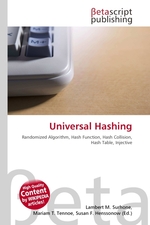Universal Hashing
Lambert M. Surhone, Miriam T. Timpledon, Susan F. Marseken
бумажная книга
High Quality Content by WIKIPEDIA articles! Universal hashing is a randomized algorithm for selecting a hash function F with the following property: for any two distinct inputs x and y, the probability that F(x)=F(y) (i.e., that there is a hash collision between x and y) is the same as if F was a random function. Thus, if F has function values in a range of size r, the probability of any particular hash collision should be at most 1/r. There are universal hashing methods that give a function F that can be evaluated in a handful of computer instructions. Hashing was originally used to implement hash tables, taking an input such as a string and returning an index into the table for an object corresponding to the input. Since then, hashing has found other uses. For example, two inputs might be compared by checking to see if their hash values are the same. In general, a hash function is a function from a set of possible inputs, U, to a set of outputs, which is usually taken to be {1,dots,N} for some N.
Данное издание не является оригинальным. Книга печатается по технологии принт-он-деманд после получения заказа.


